牛津小学英语六年级下册
牛津译林版小学英语六年级下册《课课练》答案
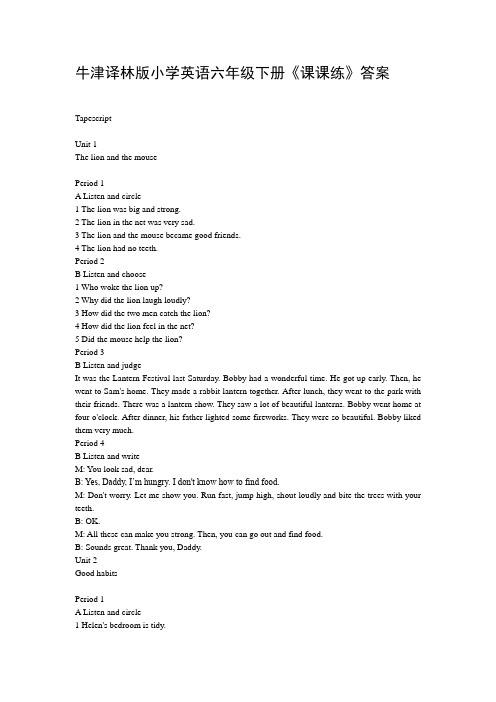
牛津译林版小学英语六年级下册《课课练》答案TapescriptUnit 1The lion and the mousePeriod 1A Listen and circle1 The lion was big and strong.2 The lion in the net was very sad.3 The lion and the mouse became good friends.4 The lion had no teeth.Period 2B Listen and choose1 Who woke the lion up?2 Why did the lion laugh loudly?3 How did the two men catch the lion?4 How did the lion feel in the net?5 Did the mouse help the lion?Period 3B Listen and judgeIt was the Lantern Festival last Saturday. Bobby had a wonderful time. He got up early. Then, he went to Sam's home. They made a rabbit lantern together. After lunch, they went to the park with their friends. There was a lantern show. They saw a lot of beautiful lanterns. Bobby went home at four o'clock. After dinner, his father lighted some fireworks. They were so beautiful. Bobby liked them very much.Period 4B Listen and writeM: You look sad, dear.B: Yes, Daddy, I’m hungry. I don't know how to find food.M: Don't worry. Let me show you. Run fast, jump high, shout loudly and bite the trees with your teeth.B: OK.M: All these can make you strong. Then, you can go out and find food.B: Sounds great. Thank you, Daddy.Unit 2Good habitsPeriod 1A Listen and circle1 Helen's bedroom is tidy.2 Liu Tao always gets up late.3 Wang Bing does his homework carefully.4 Liu Tao listens to his teachers at school.Period 2B Listen and judgeYang Ling usually gets up at seven o'clock. Then, she brushes her teeth and washes quickly. She has four lessons in the morning. She listens carefully in class. She has lunch at school. At four o'clock, she walks home. She does her homework first. Then, she helps her mother in the kitchen. She goes to bed at nine o'clock.Period 3B Listen and choose1 Do you come to school early?2 Who went to bed late last night, Mike or Helen?3 Are the horses running fast?4 Doyou put the books and toys in order?5 When do you have breakfast every day?Period 4B Listen and tickBill gets up early every morning. Then, he brushes his teeth. He does not have breakfast because he does not feel hungry. He lives near school, so he walks to school and gets to school early. He listens to his teachers in class. He does his homework carefully after school. He often helps his parents at home. He likes reading very much. He does not like sport. He cannot run fast or play ball games well.Unit 3A healthy dietPeriod 1A Listen and tickMike has some bread and milk for breakfast. For lunch and dinner, he has a lot of rice, some fish and some meat. Yang Ling often has a lot of noodles for breakfast. She sometimes eats an egg too. For lunch and dinner, she eats some meat and some vegetables. She only eats a little rice.Period 2B Listen and judge1 I have a hamburger and a big glass of cola for dinner.2 Jim eats an egg every day.3 Kevin eats ten sweets at a time.4 Liu Tao eats a lot of meat for lunch and dinner.5 Helen eats an apple a day.Period 3B Listen and chooseSteve is a tall and fat boy. He does not have breakfast because he often gets up late. He likeseating fast food. He usually has a hamburger, some chips, an apple pie and a glass of cola for lunch. He likes sweet food too. He eats a lot of sweets and ice cream at a time. He often has snacks before dinner.Questions:1 Does Steve have breakfast?2 What does Steve like eating?3 What does Steve usually have for lunch?4 How many sweets does Steve eat at a time?5 Does Steve have a healthy diet?Period 4B Listen and writeTo keep healthy, we should have a healthy diet. We should have a lot of vegetables and fruit. They have a lot of vitamins and help keep us healthy and strong. We can have some meat and fish for our meals, but we cannot eat too much. Cola and many other soft drinks are usually too sweet. We should not drink too much either. We should drink a lot of water. Cakes and ice cream are yummy food, but we should eat a little at a time.Unit 4Road safetyPeriod 1A Listen and number1 There are many busy roads in the city.2 To cross the road safely, you must look for a zebra crossing first.3 We must look at the traffic lights.4 We must wait for the green light on the pavement.5 We can cross the road with other people.6 We must not play on the road because there are a lot of cars and bikes.Period 2B Listen and circle1 Here's the green man. Please cross the road.2 You must look for a zebra crossing.3 This is a busy road.4 We mustn't turn right here.5 You can wait on the pavement.6 You can't park your car here.Period 3B Listen and choose1 A: Stop, Tim!B: What's the matter?A: Look. There's a red man.B: Oh, I see. We must wait for the green man.Q: What are they doing?2 A: Anna, do drivers drive on the right side of the road in Hong Kong?B: No. They drive on the left side.Q: Do drivers drive on the left side of the road in Hong Kong?3 A: Mum, there's a green light. Why do you stop here?B: Look, Tim. A dog is crossing the road.A: We must wait and let it go first.B: Right!Q: Is there a red light now?4 W1: How do you go to school, Miss Ma?W2: I usually drive to school. How about you, Miss Zhang?W1: I walk to school every day because I live near school.Q: How does Miss Zhang go to school?5 A: Dad, there are no traffic lights here. How can we cross the street?B: We must first look left, then right and then left again.A: OK. Let's cross the street together.B: You're so clever.Q: Are there any traffic lights in this street?Period 4B Listen and writeHello, boys and girls. I'm Officer Yang. I'm a traffic policeman. Now I’d like to tell you some traffic rules. Listen carefully, please. You must cross a road or a street at the zebra crossing. You must look out for cars. You must look left, then look right and then look left again. When you see the green man, you can go. You should walk quickly. You mustn't ride a bike or play on the zebra crossing.Unit 5A partyPeriod 1A Listen and match1 A: Is Su Hai going to bring any toys to the party?B: Yes, she is.2 A: What's Wang Bing going to bring to the party?B: He's going to bring some balloons.3 Liu Tao is going to bring some snacks and drinks to the party.4 A: Is Yang Ling going to buy any flowers?B: No. She's going to buy some fruit.Period 2B Listen and judge1 Tim is reading a book in the park.2 Helen is going to draw a picture.3 A: What's Wang Bing going to do after school?B: He's going to play basketball.4 Su Hai and Su Yang are going to swim this Sunday afternoon.Period 3B Listen and choose1 They are going to have the party at Sam's house.Q: Where are they going to have the party?2 G: I'm going to bring some snacks to the party. What about you, Mike?B: I'm going to bring some drinks.Q: What is Mike going to bring to the party?3 The party is going to begin at four thirty.Q: When should we arrive?4 Mr Green has a headache. He can't go to the party this evening.Q: Is Mr Green going to the party this evening?5 B: Look, Helen. These flowers are beautiful.G: Yes. They're Nancy's.Q: Whose flowers are they?Period 4B Listen and judgeChristmas is coming. There is going to be a party at school on Saturday evening. Yang Ling is going to bring some toys to the party. Nancy is going to bring some sweets. Liu Tao is going to bring some fruit. Mike cannot come to the party because he is going to visit his grandparents in the UK. He is coming back after New Year's Day.Unit 6An interesting countryPeriod 1A Listen and number1 I like Australian football games very much.2 Mike is chatting with his e-friend on the Internet.3 Yang Ling will look for some books in the library after school.4 You will find kangaroos in Australia.5 Sydney is a beautiful city.6 Koalas live in trees.Period 2B Listen and judgePeople in the UK do not talk very much on the bus or underground. They usually sit quietly and look out of the window. They sometimes read books and newspapers. When they talk, they often talk about the weather. They have a lot to say about this topic. To be friendly, you can say, “It's a lovely day!”Period 3B Listen and writeFootball is the most popular sport in the US. People usually call it American football. It is different from the football in the UK. In American football, each team has 11 players. They play with an oval ball. It looks like an egg. Players can kick, throw and even run with the ball. It is a very exciting sport. Many children also love it very much.Period 4B Listen and judgeIt is Friday afternoon. Miss Li and her students are in the classroom. They are talking about their plans for the weekend. Yang Ling will have a piano lesson on Saturday morning. Nancy will go tothe museum with Helen on Saturday afternoon. Mike and Tim will go to the park to draw pictures on Sunday morning. They both like drawing. Wang Bing and Liu Tao will have a football match on Sunday afternoon. Miss Li will go to watch the match.Unit 7Summer holiday plansPeriod 1A Listen and number1 Sydney is a big city in Australia.2 I will go to Shanghai this weekend. It is a beautiful city.3 You will find Big Ben in London.4 You will find Tian'anmen Square in Beijing.5 Su Hai will go to Disneyland in Hong Kong.6 Nancy comes from the US.Period 2B Listen and judge1 My family will go to Hong kong for Chinese New Year.2 Miss Li will go to Paris for the summer holiday.3 You will find the London Eye in the UK.4 Mr Green went to Beijing and visited the Great Wall last summer.5 My family will go to Sanya for the National Day holiday.6 I will stay in Taipei for two weeks.Period 3B Listen and judgeIt is Sunday. Yang Ling gets up early. She will go to the library with her friend Helen in the morning. They will look for some books about animals of Australia. They will go by bus. After lunch, Yang Ling will have a piano lesson. Then, she will go to the supermarket with her parents. They will buy some fruit and vegetables for the next week. After that, they will go to a restaurant for dinner. They will eat some seafood. They all like seafood very much.Period 4B Listen and write1 A: What will you do this Sunday?B: I'll visit my grandparents. They live on a farm. I'll go and help them.2 It was Saturday morning. Mr and Mrs Green went to a new shopping centre by car. They boughta lot of things. On their way home, they lost their way. Mr Green asked an old woman, “Excuse me, where am I now?” The old woman looked at Mr Green and the car and said, “You're in your car, sir.”Unit 8Our dreamsPeriod 1A Listen and circle1 My father is a dentist.2 Yang Ling wants to be a pianist.3 Mrs Zhang is a nurse. She is very busy every day.4 Li Xiang likes playing basketball. He wants to be a basketball player.5 Mr Huang is a bus driver. He goes to work very early.6 Wang Fang is a policewoman. She wants to help people.Period 2B Listen and match1 A: What do you want to be in the future, Bobby?B: I want to be a cook. I can cook nice food for my family.2 A: I want to be a doctor. What about you, Tim?B: I want to be a teacher. I want to teach students Science.3 Emily wants to be a policewoman.4 Su Yang likes helping people. She wants to be a nurse.Period 3B Listen and judgeThe children are talking about their dreams. Sandy likes painting. She has some painting lessons every week. She wants to be an artist. Mary likes dancing. She can dance beautifully. She wants to be a dancer. Tom is good at sport. He likes playing football. He wants to be a football player. Danny wants to be a policeman. He thinks policemen are cool. He likes films about policemen. Period 4B Listen and choose1 A: I want to be an artist in the future. What do you want to be, Tim?B: I want to be an astronaut.Q: What does Tim want to be?2 A: What do you like, Benny?B: I like playing football.A: Do you want to be a football player in the future?B: Yes. I want to play in the World Cup.Q: What is Benny's dream?3 B1: Do you like playing table tennis, Mike?B2: No, I don't. I like playing basketball. How about you, Liu Tao?B1: I like playing football.Q: What does Mike like doing?4 A: Billy likes eating. He wants to be a cook. What do you want to be, Willy?B: I like eating too, but I don't want to be a cook. I want to be a scientist.Q: Does Willy want to be a cook?5 G1: Where will you go this summer holiday, Nancy?G2: I'll go to Hangzhou. What about you, Yang Ling?G1: I'll go to Beijing with my parents.Q: Who will go to Hangzhou this summer holiday?Test forUnit 1A Listen and circle1 The mouse is small and weak.2 Please don't talk loudly in the library.3 The baby often bites his fingers.4 The mouse helped the lion get out of the net.5 The rabbit walked by and woke the tiger up.B Listen and choose1 Where are you going?2 What did you do last weekend?3 Let's go and cheer for Mike.4 Where is the ball?5 Please sing loudly, boys.C Listen and choose1 A: Can you swim, Liu Tao?B: No, I can't. My friend Mike can.Q: Who can swim?2 A: Do you like playing basketball, Frank?B: No, I don't.A: What do you like doing?B: I like playing football. I'm good at it.Q: Does Frank play football well?3 B1: Did you watch TV last night, Tim?B2: No. I made a card for my mother. Today is her birthday.Q: What did Tim do for his mother?4 A: Look at the grapes on the vine, Sam. Can you pick some for me?B: Sorry, Bobby. They're so high. I can't reach them.Q: Can Bobby eat the grapes?5 A: What does your uncle do, Wang Bing?B: He's a farmer. He grows vegetables and flowers.A: Is your aunt a farmer too?B: No. She's a teacher. She teaches Music.Q: What does Wang Bing's aunt do?D Listen and writeSam and Bobby are playing table tennis happily. They are both good at it. Billy and Willy are cheering for them loudly. Sam is very excited. He hits the ball hard. Then, they cannot find the ball. The ball drops into a hole. Sam pours some water into the hole. They get their ball back. Test forUnit 2@@A Listen and circle1 I never watch TV late at night.2 How messy your room is!3 We should finish our homework early.4 Please listen to Miss Li carefully.5 Mike always brushes his teeth before bedtime.B Listen and choose1 Do you go to school early in the morning?2 When does Wang Bing go to bed?3 Would you like some juice?4 Did Liu Tao go to bed late last night?5 Please put your books in order.C Listen and choose1 A: Do you go to bed early, Liu Tao?B: No, I don’t. My friend Wang Bing does.Q: Who goes to bed early?2 A: Does Li Qiang run fast?B: No, he’s not good at running, but he jumps very high.Q: Does Li Qiang jump high?3 A: Wow, your room is so clean and tidy, Yang Ling. That’s a good habit.B: Thanks. My mother often tells me to put my things in order.Q: What habit does Yang Ling have?4 A: Wake up, Mike.B: Sorry, Miss Li.A: Did you go to bed late last night?B: Yes. I watched a football game.Q: Where is Mike now?5 A: What time did you get to school today, Su Yang?B: At seven forty, but I usually get to school at seven thirty.Q: What time did Su Yang get to school today?D Listen and writeLiu Tao has some good habits and some bad habits. He always gets up and goes to school early. He does well at school. He listens to his teachers carefully in class. He is quiet in the library. But he does his homework late. He usually finishes his homework at ten at night. He often feels sleepy in the morning.Test forUnit 3A Listen and circle1 He has a few eggs every week.2 Helen drinks a little milk for breakfast.3 He often eats a lot of bread every day.4 Mike likes eating rice.5 He likes eating mangoes very much.6 We should not drink too much cola.B Listen and choose1 Do Chinese people often have some porridge for breakfast?2 Is there any juice in the fridge?3 What did you have for lunch?4 Is milk good for our health?5 Should we drink a lot of water every day?6 Would you like some ice cream?C Listen and judgeWang Bing has a healthy diet. For breakfast, he always has some bread, some porridge and an egg. He has lunch at school. He usually has some rice, some meat and a lot of vegetables. He likes eating carrots and tomatoes. He likes eating fruit too. He often has an apple or a banana between lunch and dinner. He does not eat a lot for dinner. He usually has some rice, some vegetables and some soup.D Listen and writePeter always has some milk and bread for breakfast. He usually has a little rice, some chicken and some vegetable soup for lunch. He has some noodles, some fish and some vegetables for dinner. He eats an apple every day. He likes fruit very much.Test forUnit 4A Listen and circle1 Please don't park your car on the pavement, sir.2 Wang Bing is wearing a red shirt. You can see him easily.3 The children safely crossed the street.4 Turn left at the first crossing, Liu Tao.5 We must follow the rules at school.6 You should look out for cars and bikes on the road.B Listen and choose1 Why does the bus stop here, Dad?2 Can I watch TV after dinner?3 How do we get to the farm?4 You mustn't play football in the classroom, Liu Tao.5 What must we do in the library?6 Must drivers look at the traffic lights?C Listen and judgeTo stay safe on the road, we must follow the traffic rules. We must use the zebra crossing to cross the road. We must look at the traffic lights and wait for the green light. When there is no zebra crossing, we must look out for cars and bikes. We must look left, then right and then left again. In the UK, the traffic rules are different. Drivers drive on the left side of the road, so we must look right first, then left and then right again.D Listen and writeThere are many rules in our school. We must get to school on time. We must wear school uniforms. We must not eat or drink in class. We must keep the classroom clean and tidy, so we must clean the classroom every day. We must not play ball games in the classroom. We must follow these school rules.Mid-term testD Listen and circle1 I have a healthy diet.2 Chinese people like to have porridge for breakfast.3 It is not safe to run on the road.4 The fish is so heavy.5 The baby is crying sadly.6 We must follow the rules.7 There are a few apples in the fridge.8 Don't play on the road.9 Mike is looking for his bag.10 He always plays ball games after school.E Listen and choose1 Can I watch TV before dinner, Mum?2 What must we do on the road?3 What is good for our health?4 Why don't you go to school today?5 Please keep your desk clean.F Listen and choose1 A: Did you have any fruit for lunch, Liu Tao?B: No, I didn't. I had a lot of noodles and some meat.Q: What did Liu Tao have for lunch?2 B: Can I watch TV now, Dad? I finished my homework.M: It's late, Mike. You should go to bed now.Q: What should Mike do now?3 A: Look. Wang Bing is running fast. .B: Yes, he's good at it. He plays basketball well too.Q: What is Wang Bing good at?4 B1: Hurry up, Sam.B2: Look. There's a red man.B1: Oh, let's wait for the green man.Q: Can Bobby and Sam go now?5 A: Wake up, Liu Tao. It's time for school.B: I feel cold, Mum.A: Oh, you have a fever. Let's go to the hospital.Q: Where is Liu Tao now?G Listen and writeSu Yang and Su Hai are twin sisters. They are good girls. They have many good habits. They get up early and they always eat breakfast. They like eating vegetables and fruit. They put their things in order and keep their room clean. They do well at school. They are good at English. They both like swimming. They always look at the traffic lights and wait for the green man. They never go to bed late. They also help each other.Test forUnit 5A Listen and circle1 Make a wish, Tim.2 I like this blue shirt very much.3 We had great fun at the party.4 Did you bring a gift for Miss Li?5 There was a lot of rain last summer.6 I am going to dance at the party.B Listen and number1 G: Today is my mother's birthday. We are having a party now.2 G: What do you do at weekends?B: I often watch cartoons on TV at home.3 A: Are the children playing computer games?B: No. They're watching an interesting film.4 G: What do you like doing?B: I like playing basketball.5 A: What's Tim going to do this afternoon?B: He's going to play with his cousin Jim. .6 B: I like climbing mountains. I often go climbing with my parents.C Listen and judgeThe weekend is coming. My family are going fishing this Saturday. We all like fishing very much. We all like eating fish too because it is good for our health. On Sunday afternoon, we are going to watch a film. Then, we are going to have dinner at a restaurant. We are going to eat some dumplings. I am excited about the weekend.D Listen and writeThere is going to be a party at Mary's house this Sunday. Her friends are coming to the party. Jack is going to bring some balloons to the party. Danny is going to bring some snacks. Sue is going to bring a big cake. Tom is going to bring some fruit. He is going to make a fruit salad.Test forUnit 6A Listen and number1 Australia is an interesting country. I will go there this Christmas.2 My grandpa usually reads newspapers after dinner.3 Su Hai and her father are buying snacks and drinks at the supermarket.4 Anna is writing an email to Su Hai.5 You should take a gift when you go to a Western party.6 Sydney is a beautiful city.B Listen and circle1 I have an Australian e-friend.2 I will read this story on the Internet.3 Australian football games are really exciting.4 Spring is a rainy season in Shanghai.5 My friend sent me some photos.C Listen and judgeSingapore is a small island country. There are sixty-three islands in Singapore. Singapore is also a beautiful garden city. It is warm and wet through the year. The temperature is usually around twenty to thirty-five degrees. People in Singapore speak English, Malay and Chinese. Every July,there is a food festival in Singapore. Many people like to go to Singapore in this month because they can eat a lot of delicious food.D Listen and writeFrance is a country in Europe. Paris is its capital city. It is a beautiful city. There are a lot of interesting places to see. You will find the Eiffel Tower, the Louvre Museum and Disneyland there. The River Seine runs through the city. France is famous for its fashion and food. It also has one of the fastest trains in the world. The national flag of France has three colours. They are red, white and blue. People speak French in France.Test forUnit 7A Listen and number1 Mike will go back to the UK to see his grandparents this month.2 I like Disneyland very much. I had great fun there last summer holiday.3 Yang Ling showed us some photos of the Great Wall.4 Sydney is a great city. I like it very much.5 My father will go to Beijing by plane next week.6 I had a good time in Taipei.B Listen and circle1 Anna will go back to Hong Kong next week.2 Miss Li will have a lot of work to do after the holiday.3 Nancy will travel around the UK this summer.4 My mother wanted to take a bus to the supermarket.5 They are talking about their plans for the holiday.6 Liu Tao wants to visit many countries.C Listen and choose1 Where are your parents going?2 What time do you usually go to bed?3 Will your friends go climbing this weekend?4 Would you like to go to the party with us?5 What will Tom do this evening?D Listen and writeChildren in the US have colourful weekends. They do not have much homework, but they have a lot to learn at weekends. They learn to swim, play basketball, baseball and football. They also learn to play the piano, dance and paint. At home, they help their parents do some housework. They wash the dishes and clean the car. They work in the garden too. They take care of the grass and the plants. Sometimes, they even do part-time jobs at weekends. They sell drinks or newspapers in the street. They are busy at weekends, but they learn a lot.Test forUnit 8A Listen and number1 Bobby wants to be a scientist in the future.2 Su Hai likes dancing. She has dancing lessons every week.3 Mr Lin is a dentist.4 Miss Chen is a great basketball player. She often plays in matches.5 Mrs White is not good at driving. She drives very slowly. .6 Yang Ling plays the piano very well. She wants to be a pianist.B Listen and circle1 I learn to dance after school.2 I want to travel around the world in the future.3 Mike is good at Science.4 People eat rice dumplings at the Dragon Boat Festival.5 Fruit and vegetables are good for our health.6 My dream will come true some day.C Listen and choose1 What does she want to be?2 Does Bobby want to be a traveller?3 Nancy is good at writing. What does she want to do?4 When will Mike go back to the UK?5 What did you do last Sunday?D Listen and writeRoss is sixteen years old. He likes painting very much and he wants to be an artist in the future. He plans to have some painting lessons in the summer holiday. To get some money for the lessons, he now works in a fast-food restaurant after school and at weekends. He does the cleaning and washes the dishes. He works very hard. He likes the job because it will help make his dream come true.Final testD Listen and choose1 Nancy only drinks a little milk for her breakfast.2 There is a clown with a lot of balloons at the shopping centre.3 Tim cannot play football very well.4 The girls cheer for Mike and Liu Tao loudly.5 How can we cross the road safely?E Listen and judge1 The children are playing basketball on the road.2 Lily wants to be a teacher in the future.3 John can sing well.4 He is going to the library on Sunday afternoon.5 Lizzy makes her bed every morning.6 Bobby goes to school by bus every day.F Listen and choose1 Mr Wu had a busy day yesterday.2 He walked to school today.3 Mr Brown comes from the UK.4 Mary is not good at swimming.5 Did you have a good time in China?G Listen and writeA good place can help us do our homework well and fast. The living room is not a good place to do our homework because it is usually noisy. It is a place for rest, not for work. We should find a quiet room, like our bedroom. A quiet place can help us think quickly and learn well. Before we begin to do our homework, we should clean our desk and put things in order. A clean and tidy desk can make us feel good.Answer keyUnit 1Period 1A 1 a 2 a 3 b 4 bB 1 T 2 T 3 F 4 F 5 TC was, large/big, strong, wanted, help, weak, let, caught, bit, saw, made, got, becamePeriod 2A 略B 1 a 2 b 3 a 4 a 5 aC 1 f 2 9 3 d 4 b 5 c 6 h 7 a 8 eD happy, good, well, loudly, sadly, happyE help, happened, caught, worry, bite, made, get, outF 1 c 2 a 3 c 4 c 5 a 6 bPeriod 3A 略B 1 T 2 F 3 T 4 F 5 TC 1 excitedly 2 loudly 3 visited, was 4 did, get 5 sadly, findD a 4 b 2 c l d 3E 1 b 2 a 3 c 4 c 5 cPeriod 4A 略B sad, hungry, fast, high, loudly, bite, strong, greatC 1 e 2 c 3 b 4 a 5 dD 1 a 2 b 3 c 4 b 5 a 6 bE 1 singing, happily 2 talk, loudly, library3 poured, hot, water, into, gave4 From, then, on, became, friendsF 1 F 2 T 3 F 4 T 5 TUnit 2Period 1A 1 b 2 b 3 b 4 aB 1 T 2 F 3 T 4 F 5 TC good, listens, clean, tidy, helps, bad, late, bed, sleepyPeriod 2A 略B 1 T 2 F 3 T 4 T 5 F。
牛津版小学英语六年级下册unit-7-helping-others
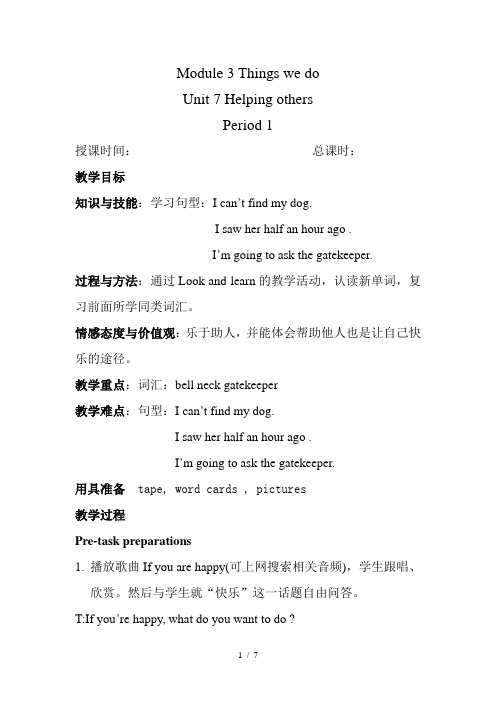
Module 3 Things we doUnit 7 Helping othersPeriod 1授课时间:总课时:教学目标知识与技能:学习句型:I can’t find my dog.I saw her half an hour ago .I’m going to ask the gatekeeper.过程与方法:通过Look and learn的教学活动,认读新单词,复习前面所学同类词汇。
情感态度与价值观:乐于助人,并能体会帮助他人也是让自己快乐的途径。
教学重点:词汇:bell neck gatekeeper教学难点:句型:I can’t find my dog.I saw her half an hour ago .I’m going to ask the gatekeeper.用具准备tape, word cards , pictures教学过程Pre-task preparations1.播放歌曲If you are happy(可上网搜索相关音频),学生跟唱、欣赏。
然后与学生就“快乐”这一话题自由问答。
T:If you’re happy, what do you want to do ?S1: I want to …然后同桌见互相问答,看看学生对快乐是怎样理解的。
While-task procedures1.播放Listen and say的录音,学生听录音。
然后教师提问,学生尝试回答问题。
初步了解对话大意。
1)How many people are there in the dialogue?(Five.)2)Who are they?(Peter, Sally, a boy, a man and a woman.)3)Where are they?(They are in a park.)4)What’s the matter with the boy?(He can’t find his dog.)学生打开课本,独立阅读课文,核对问题答案。
牛津版小学英语六年级下册第二模块第五单元第4课时教案
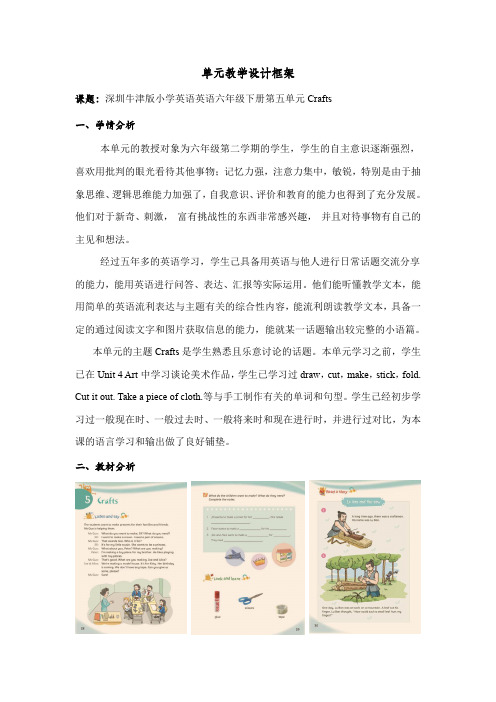
单元教学设计框架课题:深圳牛津版小学英语英语六年级下册第五单元Crafts一、学情分析本单元的教授对象为六年级第二学期的学生,学生的自主意识逐渐强烈,喜欢用批判的眼光看待其他事物;记忆力强,注意力集中,敏锐,特别是由于抽象思维、逻辑思维能力加强了,自我意识、评价和教育的能力也得到了充分发展。
他们对于新奇、刺激,富有挑战性的东西非常感兴趣,并且对待事物有自己的主见和想法。
经过五年多的英语学习,学生己具备用英语与他人进行日常话题交流分享的能力,能用英语进行问答、表达、汇报等实际运用。
他们能听懂教学文本,能用简单的英语流利表达与主題有关的综合性内容,能流利朗读教学文本,具备一定的通过阅读文字和图片获取信息的能力,能就某一话题输出较完整的小语篇。
本单元的主题Crafts是学生熟悉且乐意讨论的话题。
本单元学习之前,学生已在Unit 4 Art中学习谈论美术作品,学生已学习过draw,cut,make,stick,fold. Cut it out. Take a piece of cloth.等与手工制作有关的单词和句型。
学生己经初步学习过一般现在时、一般过去时、一般将来时和现在进行时,并进行过对比,为本课的语言学习和输出做了良好铺垫。
二、教材分析本单元采用的教材是《深圳牛津版小学英语》小学六年级下册第二模块Module 2 Work and play中的第五单元Unit 5 Crafts。
Listen and say 呈现了一节手工课上的对话,Ms Guo和同学们讨论打算做什么,需要什么材料及作品送给谁。
Look and learn教授glue,scissors,tape三种手工用具。
Read a story呈现了《鲁班与锯子》的经典民间故事,鲁班手指被草叶割伤,由此受到启发发明了锯子。
Make and say 介绍了如何制作一个拼图,然后用What do we need? We need...说一说所需要的材料。
新沪教牛津版六年级下册小学英语全册单元知识点小结
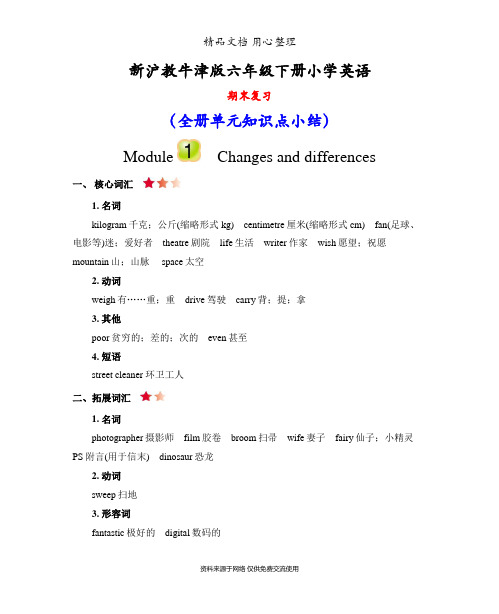
新沪教牛津版六年级下册小学英语期末复习(全册单元知识点小结)Module Changes and differences一、核心词汇1. 名词kilogram千克;公斤(缩略形式kg)centimetre厘米(缩略形式cm)fan(足球、电影等)迷;爱好者theatre剧院life生活writer作家wish愿望;祝愿mountain山;山脉space太空2. 动词weigh有……重;重drive驾驶carry背;提;拿3. 其他poor贫穷的;差的;次的even甚至4. 短语street cleaner 环卫工人二、拓展词汇1. 名词photographer摄影师film胶卷broom扫帚wife妻子fairy仙子;小精灵PS附言(用于信末)dinosaur恐龙2. 动词sweep扫地3. 形容词fantastic极好的digital数码的4. 副词online在线地;在线的5. 代词themselves他们自己;她们自己;它们自己6. 其他taller更高的7. 短语go fishing去钓鱼enjoy oneself玩得愉快;得到乐趣get … in收割street sweeper扫地车by hand用手right away立即;马上in a short time很快head teacher 校长 a piece of一张;一片have a picnic去野餐better and better越来越好三、核心句型1. I’m 150 centimetres tall. 我身高150厘米。
解读:这是介绍身高的句型。
“主语 + be动词 + 数字 + 长度单位(+ tall).”可以用来介绍某人的身高。
举一反三: My cousin is 154 centimetres tall. 我的堂弟身高154厘米。
Jim is 149 centimetres tall. 吉姆身高149厘米。
2. There are a lot of tall buildings in the city. 城市里有很多高大的建筑物。
上海沪教牛津版小学六年级英语下册Unit 1 You and me 习题及答案
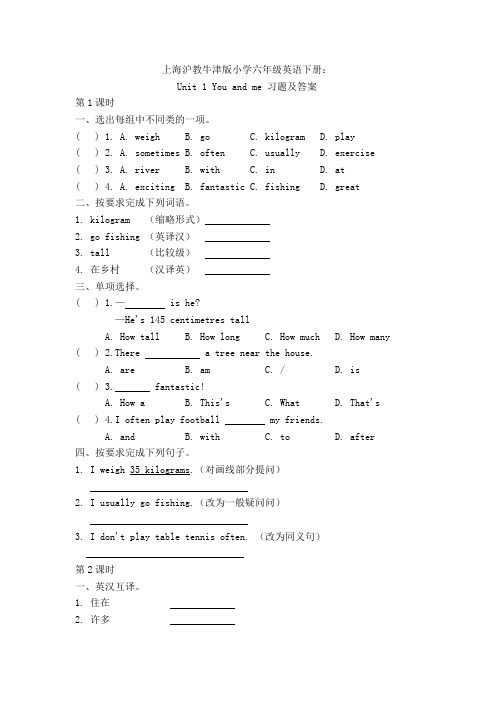
上海沪教牛津版小学六年级英语下册:Unit1You and me习题及答案第1课时一、选出每组中不同类的一项。
()1.A.weigh B.go C.kilogram D.play()2.A.sometimes B.often ually D.exercise ()3.A.river B.with C.in D.at()4.A.exciting B.fantastic C.fishing D.great二、按要求完成下列词语。
1.kilogram(缩略形式)2.go fishing(英译汉)3.tall(比较级)4.在乡村(汉译英)三、单项选择。
()1.—is he?—He's145centimetres tallA.How tallB.How longC.How muchD.How many ()2.There a tree near the house.A.areB.amC./D.is()3.fantastic!A.How aB.This'sC.WhatD.That's ()4.I often play football my friends.A.andB.withC.toD.after四、按要求完成下列句子。
1.I weigh35kilograms.(对画线部分提问)2.I usually go fishing.(改为一般疑问问)3.I don't play table tennis often.(改为同义句)第2课时一、英汉互译。
1.住在2.许多3.at the weekend4.enjoy oneself二、判断图片与所给词语是(T)否(F)一致。
()1.at the theatre()2.in the countryside()3.plant crops 三、选择合适的词语完成句子。
1.My father goes to work car.2.There are many houses gardens.3.George likes ride his bike.4.autumn,farmers get the crops in.四、选出句子中错误的一项并改正。
沪教牛津版小学英语六年级下册单词(手机版)
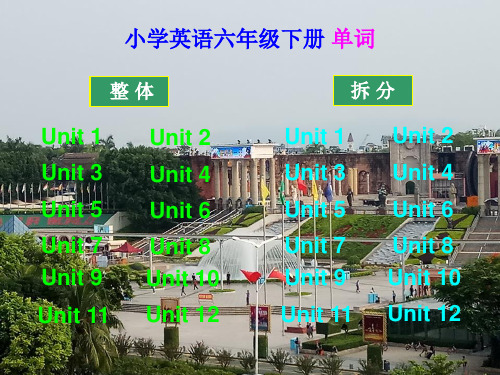
film
胶卷
digital
数码的
street cleaner 环卫工人
sweep
扫地
broom
扫帚
drive
驾驶
street sweeper 扫地车
英中全
Unit 2 - 02
wife poor fairy wish by hand right away in a short time
妻子 贫穷的;差的;次的 仙子;小精灵 愿望;祝愿 用手 立即;马上 很快
西方的 火鸡 明亮的;鲜艳的 嘲笑 南瓜灯
英中全
Unit 12 - 01
pea
豌豆
pod
豆荚
forever 永远
bigger
更大的
excited 兴奋的
bullet
子弹
lazy
懒惰的
roof
屋顶
yard
院子
hit
碰撞;撞击
英中全
Unit 12 - 02
see the world one by one look out of
担心
follow
跟随;跟着
in the middle 在中间
look out 小心;当心
英中全
Unit 8 - 02
no smoking no swimming
get lost some time on the way
禁止吸烟 禁止游泳 迷路 一段时间 在路上
英中全
Unit 9 - 01
reuse
Unit 11
Western 西方的 turkey 火鸡 bright 明亮的;鲜艳的 laugh at 嘲笑 jack-o'-lantern 南瓜灯
译林牛津版小学六年级下册英语阅读理解及答案

译林牛津版小学六年级下册英语阅读理解及答案一、阅读理解1.阅读理解阅读短文,判断正误Mr. White has a daughter and a son. They live in the countryside. It is near a mountain. They were very poor before. They had little money. They bought some seeds. They planted rice, carrots and beans in the field. They worked very hard,and they were very happy.One day, some big birds came. They ate the rice, the beans and the carrots. Mr. White was very angry. He got the birds out of his field, and then he put some scarecrows(稻草人)in the field. There are no birds now. In autumn, Mr. White has got a lot of beans, carrots and rice. The Whites are happy again. They are not poor now.(1)Mr. White has two children.(2)The Whites live in the countryside and it is far from a mountain.(3)The Whites didn't buy any seeds with their money.(4)Mr. White put some scarecrows in the field.(5)Mr. White got lots of rice and vegetables in winter at last.【答案】(1)1(2)0(3)0(4)1(5)0【考点】阅读理解【解析】【分析】文章大意:介绍怀特先生一家在乡村种庄稼的事情。
牛津版小学英语六年级下册第四模块第十单元第4课时教案
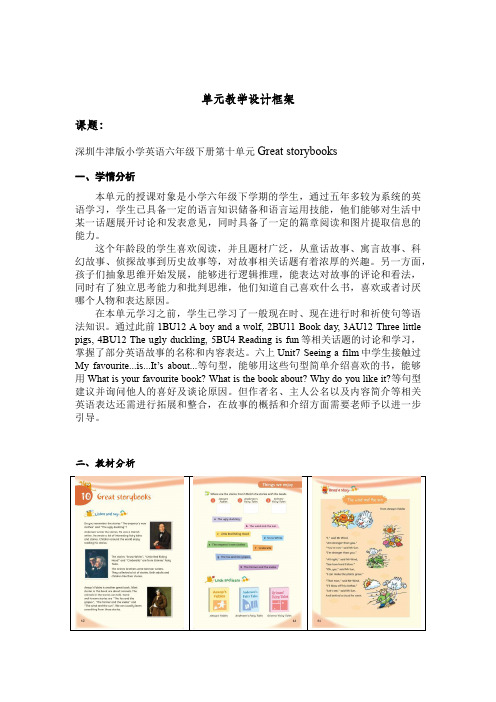
单元教学设计框架课题:深圳牛津版小学英语六年级下册第十单元Great storybooks一、学情分析本单元的授课对象是小学六年级下学期的学生,通过五年多较为系统的英语学习,学生已具备一定的语言知识储备和语言运用技能,他们能够对生活中某一话题展开讨论和发表意见,同时具备了一定的篇章阅读和图片提取信息的能力。
这个年龄段的学生喜欢阅读,并且题材广泛,从童话故事、寓言故事、科幻故事、侦探故事到历史故事等,对故事相关话题有着浓厚的兴趣。
另一方面,孩子们抽象思维开始发展,能够进行逻辑推理,能表达对故事的评论和看法,同时有了独立思考能力和批判思维,他们知道自己喜欢什么书,喜欢或者讨厌哪个人物和表达原因。
在本单元学习之前,学生已学习了一般现在时、现在进行时和祈使句等语法知识。
通过此前1BU12 A boy and a wolf, 2BU11 Book day, 3AU12 Three little pigs, 4BU12 The ugly duckling, 5BU4 Reading is fun等相关话题的讨论和学习,掌握了部分英语故事的名称和内容表达。
六上Unit7 Seeing a film中学生接触过My favourite...is...It’s about...等句型,能够用这些句型简单介绍喜欢的书,能够用What is your favourite book? What is the book about? Why do you like it?等句型建议并询问他人的喜好及谈论原因。
但作者名、主人公名以及内容简介等相关英语表达还需进行拓展和整合,在故事的概括和介绍方面需要老师予以进一步引导。
二、教材分析本单元是《深圳牛津版小学英语》小学六年级下册第四模块Module 4 Things we enjoy中第十单元Unit 10 Great storybooks,其教学内容主要是学习经典著作并谈论自己最喜爱的书籍和故事。
- 1、下载文档前请自行甄别文档内容的完整性,平台不提供额外的编辑、内容补充、找答案等附加服务。
- 2、"仅部分预览"的文档,不可在线预览部分如存在完整性等问题,可反馈申请退款(可完整预览的文档不适用该条件!)。
- 3、如文档侵犯您的权益,请联系客服反馈,我们会尽快为您处理(人工客服工作时间:9:00-18:30)。
牛津小学英语六年级下册
作者:张萍
来源:《中文信息》2016年第04期
一、教学内容
单元复习课
二、教学目标
1.学生能够熟练复述背诵story time 部分课文。
2.学生能够掌握区分情态动词can 和must 的不同之处。
3.学生能够熟练运用情态动词进行对“rule”的表述。
4.培养学生的规则意识,树立“安全”意识。
三、教学重难点
1.情态动词的正确熟练运用。
2.学生能够熟练运用情态动词进行对“rule”的表述,谈论“安全”问题。
四、教学准备
随堂练习纸,单词卡
五、学生预习内容
了解Safety 相关内容。
六、教学过程
Step1: Warm up
Watch a short video about how
to cross the road.
Q: What are they talking about?
Q: What are the four steps?
【设计意图:观看外国原声视频,激发学生学习兴趣,调动学习积极性。
】
Step2: Revision
Retell story time(复述story time 课文)
How can we cross the road safely?
What must we not do on the road?
【设计意图:根据图片提示,要求学生用自己的语言回顾所学。
】
Step3: Presentation and practice
1.教师给出提示性问题,激发学生积极思考
1)What is the girl doing? Is she right/ safe?2)Where is girl walking ?
Get one student to tell the kids what they must do or mustn’t do.
【设计意图:提供课外图片,增加知识习得新鲜度,复习操练本课重点句型。
】
2.Find the rules
Show the four key sentences. Focus on the words. We call them Modal verbs. And we find the rules. 情态动词+动词原形
两者区别:Must:语气最强烈,表示命令或权威。
Can:表示可能,允许和能力等。
3.Checking time
Students do the exercise about “can and must”.
【练习意图:根据知识的梳理,随堂检测学生掌握情况,第一时间反馈。
】
4.Modal Family
Get students to list the other modal verbs that have learned.
Get them to make sentences with each modal verbs.
Teacher can have short chat with each student.
Eg: S1, May I come in? T, Yes, come in please.
S2, Would you like to have some juice? T, Yes,I’d love to.
【设计意图:通过师生机动的课堂对话,激发语言的真实运用。
】
5. Read and try
Good Job! Have look at this passage, please help me to fill in the blanks.
Students work in groups to discuss and finish the task.
T, What do you know about fire safety?
6. Reading comprehension
Get students to read the passage and find out the answer to the question above.
Step4 Consolidation
Do you know some other things that we care about?
Encourage students to choose one topic and talk about it.
Home safety
School safety
Food safety
【设计意图:学生四人一组讨论完成。
例举各个场景的规则,树立团队合作,互助学习的意识。
】
Homework.
1)Try to write a short passage about safety.
2)Make a poster in a group of four.
3)Try to be a safety guard in one’s life.。
